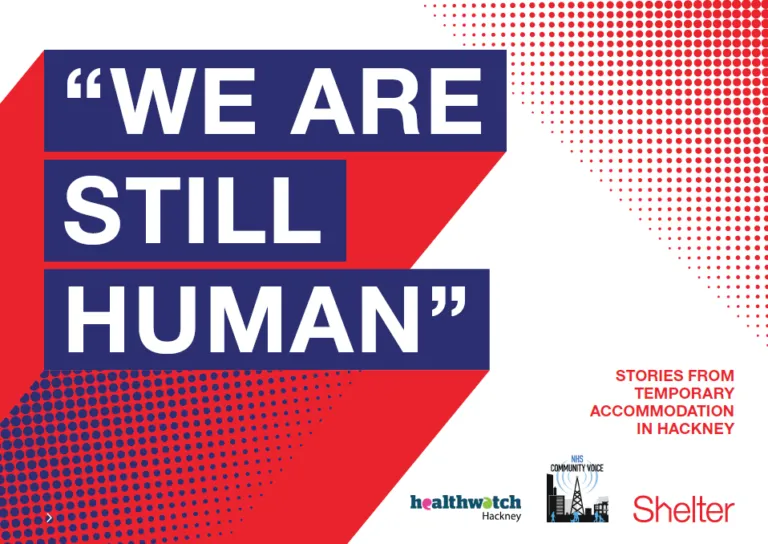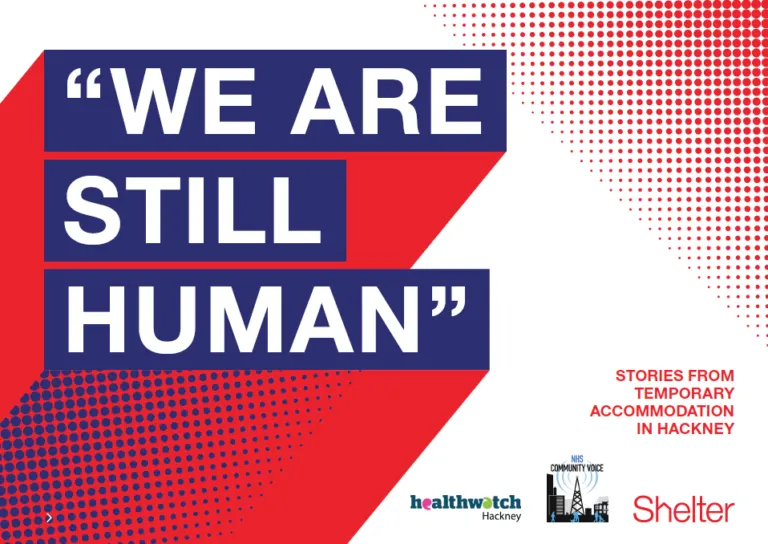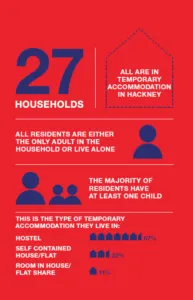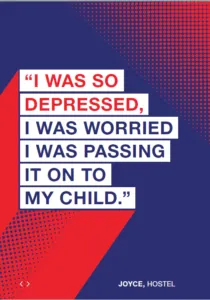Hackney temporary accommodation residents come together to call for change
Published: by Tyrone Scott

In late 2020, residents in temporary accommodation from across the London Borough of Hackney came together to talk about their experiences and what changes they want to see. Supported by Healthwatch Hackney and NHS Community Voice, our London hub embarked on a listening campaign. We wanted to better understand and capture these experiences, and help launch a campaign for change with residents in temporary accommodation.
This listening campaign consisted of in-depth one-on-one telephone surveys with 27 residents in temporary accommodation across Hackney. We then held focus groups with nine of the residents, where we could understand the issues and how to solve them.
Today, our London hub and Healthwatch Hackney released their findings. They paint a vivid picture of life in temporary accommodation and what could improve residents’ lives.

Many people live in temporary accommodation in London. Across the UK, of all the residents living in temporary accommodation, a staggering 68%* live in the capital.
Situated in the London Borough of Hackney, our London hub identified an alarming number of people in temporary accommodation contacting us for support. On closer examination of our data, a significant proportion come from Hackney.
Alongside this, we and Healthwatch Hackney are members of the local Temporary Accommodation Action Group (TAAG). Other members include local organisations, residents, and landlords, who want to address issues within temporary accommodation. The group identified that there’s work to be done to improve the experience for residents in temporary accommodation across the borough.
Over 3,000 households live in temporary accommodation in Hackney, including nearly 4,000 children.** This reflects the scale of the issues raised. But although this work is based in Hackney, we’re acutely aware that these experiences are felt by many across the capital. The most recent figures show 58,730 households recorded as homeless and in temporary accommodation in London, including 40,870 families.** We’re excited to see how this work can be replicated in other boroughs across the capital and will help continue discussions around temporary accommodation.
Of those 27 residents who engaged in the Hackney campaign and contributed to our findings, most live in hostels – with some in self-contained flats or a room in a shared house. The majority also have at least one child.

Through the themes that emerged from our research, we helped residents put together clear recommendations on what would begin to improve their situation. While we know that the solution to the housing crisis is to ensure we build more social housing, we know there is much to be done to improve the lives of those living in unsuitable conditions in the meantime.
1. All residents should have access to wi-fi
So they can work, study and socialise without having to depend on unreliable and expensive phone data. Through our telephone surveys with 27 residents, we found that two-thirds of the residents we spoke to did not have access to wi-fi, whether free or paid.
My son can’t do online homework because we don’t have internet. The teacher shamed him front of the whole class.
Samantha, living in a self-contained flat
‘My last hostel said if I install wi-fi, I would go to court.’
Zoe, living in a self-contained flat
‘I’m trying to do my degree but have no internet. No visitors are allowed and I have a three-year-old to take care of.’
Sadira, living in a hostel

2. All residents should have access to laundry facilities
Facilities that work, are within walking distance, and available at a reasonable price – if not free. One-third of the residents we spoke to had no access to a washing machine in their temporary accommodation.
There are no communal washing facilities. I have to walk 20 minutes to the launderette, where it’s £7 for a small wash.
Vivien, living in a hostel
‘Only one washing machine works.’
Laureen, living in a hostel
‘There are six washing machines for 148 rooms, and five of them are broken.’
Joyce, living in a hostel
3. Residents must be given information when they move
About where they’re moving to, how to access local services, and what rights they have. Over 80% of the 27 households we spoke to in late 2020 were not told how to access local services.
Nobody showed me where I was supposed to move, they just gave me an address. I was knocking and asking people until someone came out and told me it was temporary accommodation.
Ciara, living in a self-contained flat
‘I’ve never lived on my own. I had no information on how council tax or benefits work, which led to me getting in arrears.’
Tania, living in a self-contained flat
4. Residents should feel supported
With clear access to information about their case, and consistent support from the local authority for their well-being.
Over half the residents we spoke to said they did not know who their housing officer was. Along with this, more than three-quarters said that living in temporary accommodation has impacted their mental health.
I don’t have any support besides my neighbours. Even though we’re in a hostel, we are still human. When the council put you here, they forget about you.
Cristina, living in a hostel
‘I worry about my kids. When everything around them is so stressful, they end up worrying about things children shouldn’t have to.’
Gloria, living in a self-contained flat

5. Residents should feel empowered
Those managing temporary accommodation must listen to residents, address their concerns, and involve them in open forums, meetings, and service design.
They should also empower residents to make real change by involving them in the process. As part of our campaign, we will request a meeting between residents and key decision-makers, to ensure residents’ voices are heard.
My housing officer never got back to me. I was given a name when I moved in and they didn’t respond once. It was only when a third party got in touch that they replied. I feel like my son and I have just been left here.
Milla, living in a hostel
Read our findings in depth
These real-life experiences provide just a snapshot of our findings. Read our full report to get the full picture and learn how you can support the recommended changes.
The provision of safe and secure temporary accommodation is a key priority for Shelter London across the capital. We’ve also launched our London-wide housing manifesto, calling on the next mayor to address all aspects of London’s housing emergency, including temporary accommodation.
As our campaign continues to grow, we hope to see confirmation that our proposed changes take place. We look forward to working with residents as they begin to engage with decision-makers and seek the change they want to see.
If you want to know more, whether you’re a resident in temporary accommodation, a local organisation or are just interested in our work, please contact our Community Organiser, Tyrone Scott on 0344 515 2222 or drop him an email.
*Shelter report, ‘Report: Homeless and Forgotten: Surviving lockdown in temporary accommodation’
**Ministry for Housing, Communities, and Local Government, ‘Statutory homelessness live tables, Detailed local authority level tables: July to September 2020’, ‘Table TA1’